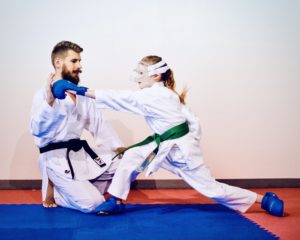
Martial Arts NYC : Karate City programs
Martial Arts NYC : You may be concerned about separation anxiety when your toddler or child begins karate lessons. This may be the first time you have left them under the supervision of someone else. It may also be that your child has already shown the symptoms of separation anxiety elsewhere. So, how should you handle separation anxiety?
The signs of separation anxiety
First of all, let’s begin by understanding what causes separation anxiety and the symptoms it displays.
Your child develops strong emotional attachments to people, such as a parent, sibling, or caregiver. Because of this, your child might become upset when it’s time for you to say goodbye. This is a normal part of childhood development, although, as a parent, you may find this unsettling.
Often, the first signs of separation anxiety occur after the child’s first birthday and up to 2.5 years of age. The symptoms can last through elementary school. Both girls and boys may have separation anxiety.
There are many signs of separation anxiety and parental separation anxiety. You may notice that your child is:
- Anxious
- Upset
- Tearful
- Crying
- Distress
- Screaming
- Agitated
- Clingy
- Prone to tantrums
- Nightmares
- Resistant to attention from others
- Bed wetting
Further symptoms to look out for include:
- Fear – your child may be fearful of unfamiliar places and people
- Temper tantrums – your child, may have repeated tantrums or pleading
- Physical symptoms – these can include headaches or stomach aches
- Refusal to sleep – your toddler might refuse to sleep away from home or when a caregiver is not present
If your child develops separation anxiety as an older child, then this may be a sign of bullying. Children over the age of six who show signs of separation anxiety may have Separation Anxiety Disorder. If this is the case, you should talk to a doctor as a first step to helping your child. Your doctor may refer you to an adolescent psychologist or psychiatrist.
How to handle separation anxiety
It may take time for your child to overcome separation anxiety. However, eventually, your kid will learn that you always come back. You should recognize that separation is essential for your child to develop their own independence. In most cases, your child won’t need medical treatment.
To make the transition of leaving your child in karate class more natural, you can:
- Make sure your child gets enough rest and is fed
- Be consistent and calm in your approach
- Reassure them that you will return
- Return when you promise to
Further separation anxiety facts and help
Infants – During infancy, your infant learns about object permanence. What this means is they realize that when you leave, you have really gone. Babies might show signs of this, but it is most likely to develop between four to five months of age. Also, the separation anxiety symptoms may become stronger as they near the age of nine months. Ensuring your infant is fed, healthy, and well-rested can help. You should also keep a regular routine, and when you leave, keep it short.
Toddlerhood – Strange as it may seem, many toddlers that develop separation anxiety, show no signs during infancy. Toddler symptoms begin to appear between the age of fifteen to eighteen months. Separation behavior can be tearful or loud and might be difficult to stop.
Preschoolers – From the age of three years, children understand the effects that their pleas or anxiety have on us. Consistency is vital, so you shouldn’t go back to your preschooler after you leave. It is essential to provide explanations to your child, and you should return when you say you will.
Here we share four more tips for dealing with kids separation anxiety:
- Practice – From an early age, you should practice separating from your infant. Allow grandparents or other family relatives to babysit, even if it is just for an hour.
- Speak their language – When you let your kid know when you will return, use language they will understand. To do this, It helps to think of events, such as after nap time or before morning snack time.
- Create a ritual – You should try to separate from your child in the same way and time each day. This builds trust, independence, and confidence that you will return.
- Be quick – Keep goodbyes short so that you do not extend the time of anxiety.
Karate City is an excellent custodian of your child during classes. We have years of experience and are experts in childhood development and self-defense. Martial Arts NYC
